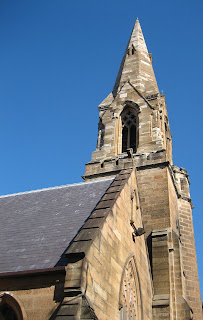 Conclusion
Conclusion
Speaking of carbon-emitters and carbon-sufferers reminds us – what has the church got to do with climate change?
I submit that only a community based on love can sustain a genuine concern for justice and sustainability in the face of ecological crisis. Lots of other movements and groups do great stuff and I thank God for them. I thank God for the IPCC: on the whole, they do us all a great service, as do many others. But the desire for change, the impulse towards justice and living wisely, cannot be sustained merely by guilt over past mistakes. Even fear, which is a great motivator, in the end can just compound the problem, because we get so terrified that we’ll buy any solution, even if we have to sell our souls to get it.
Only if we are secure in the knowledge of being held in a love that will not let go, can we step out on the risky path of putting the needs of others first. Only when we know that we are deeply loved by a God who made the heavens and the earth can we move heaven and earth out of love for our neighbour. Only when we stop thinking individualistically and start thinking as a global family can we face global problems, when the ones who are suffering from our greed or thoughtlessness are not faceless strangers, but brothers and sisters. Only when we are not paralysed by fear can we be released from the chains of denial and be honest about the scope of the problem and think clearly about creative solutions. Only when staying alive is not our primary goal, can we avoid be paralysed by threats. Only when the environment is not treated as either a resource to be exploited or a god to be worshipped can we live in harmony with it. Only when we understand ourselves as God’s image on earth, a good part of the created order with the task of enjoying and serving the creation will we stop acting like we own the place, or thinking that we are a disease that needs to be purged. Only when we see the world as a gift entrusted to our care, as the realm of God’s coming glory, as our future home, will we make more than cosmetic changes to our behaviour.
In God’s grace, there are many people doing good things in response to the threat of climate change and certainly most of them do not yet think of Jesus as a brother and God as their father, or believe that God raises the dead. That too is a gift from God. But only a community based on love, not guilt and fear, can sustain a genuine concern for all of God’s children, and for all of God’s world. As strange as it may sound, I believe that the church is the hope of the world.* The church is what God is doing now. God likes to work in surprising ways. He used a poor marginalised Jewish peasant on the outskirts of the Roman empire to turn the world upside down. He won his greatest victory through a shameful death. What is God doing now? He’s building a community full of broken and hurting people, but a community that has started to taste what it’s like to be healed.
 If you’ve never done so, then I’d like to invite you to come and taste this community at your local church. If you've had disappointing experiences before, remember, this ought to be the community that does failure and repentance and new beginnings well. Come and see whether God might be at work in surprising ways. Come and be healed. Come and become a healer. Come and be part of God’s renovation.
If you’ve never done so, then I’d like to invite you to come and taste this community at your local church. If you've had disappointing experiences before, remember, this ought to be the community that does failure and repentance and new beginnings well. Come and see whether God might be at work in surprising ways. Come and be healed. Come and become a healer. Come and be part of God’s renovation.
*Of course, Christ is the hope of the world, but the community of his followers is the sign and foretaste of his coming presence and rule.
Series: I; II; III; IV; V; VI; VII; VIII; IX; IX(b); X; XI; XII; XIII; XIV; XV.

















